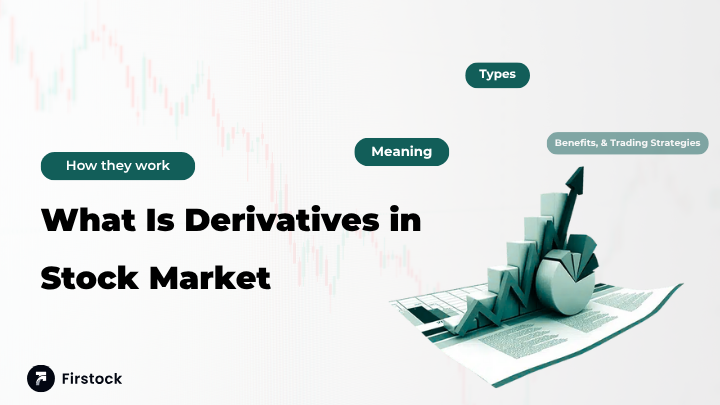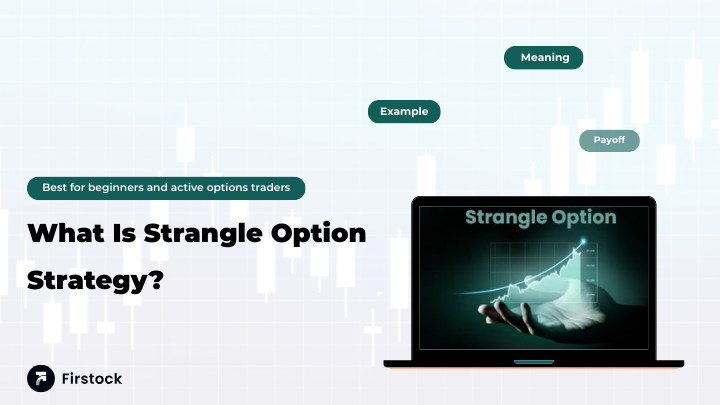Derivatives in Stock Market: 5 Steps Must-Know | Firstock

Derivatives in Stock Market: Understanding the Power of Firstock
Have you ever heard someone say, “I made a fortune trading derivatives!” and wondered what exactly they meant? Or maybe you’ve seen the term “derivatives in the stock market” thrown around but never quite understood how it works.
Well, you’re not alone. Derivatives can sound complex, but in reality, they’re simply financial tools that help you trade smarter, manage risks, and even amplify profits.
And when it comes to trading derivatives easily, Firstock — one of India’s most reliable and transparent stock trading platforms — makes the whole process smooth, safe, and efficient.
So, let’s break down what derivatives in trading are, how they work, and why Firstock is your best companion in this exciting world of financial instruments.
Disclaimer: This post is for informational purposes only and does not constitute investment advice.
What Are Derivatives in Stock Market?
To put it simply, a derivative is a monetary deal whose worth is pegged to one more asset - such as a stock, index, or commodity.
Consider it a shadow - the shadow (derivative) does not exist independent of its own; it is just a mirror of the movements of the object (the underlying asset).
In the stock market, derivatives allow you to bet on the price movement of a stock or an index — without actually owning it. That’s why they’re often used by both traders and investors to hedge risks or profit from short-term movements.
So next time you hear someone say “I’m trading derivatives in stocks,” they’re essentially trading contracts based on price expectations, not the stocks themselves.
Why Do Investors Use Derivatives?
There are three main reasons investors turn to derivatives in the stock market — hedging, speculation, and leverage.
1. Hedging (Risk Protection)
Just like you buy insurance for your car, hedging helps you protect your stock portfolio from unexpected losses.
2. Speculation (Profit from Predictions)
If you believe a stock will go up or down, derivatives let you place smart bets and profit from price swings — without buying the actual stock.
3. Leverage (Bigger Exposure, Smaller Capital)
Derivatives allow you to trade large values with smaller amounts of money. It’s like controlling a ₹10 lakh position with just ₹1 lakh — but remember, leverage magnifies both gains and losses.
Different Types of Derivatives in Stocks
When we talk about derivatives in trading, there are mainly two popular types in the stock market:
1. Futures Contracts
A futures contract is an agreement to buy or sell a commodity at a predetermined price at a later time. Both the parties have the duty to honor the contract.
For example, if you buy a NIFTY Futures contract at 22,000, you’re agreeing to buy NIFTY at that price on the expiry date — regardless of where the market is then.
2. Options Contracts
The options contract is a right and not an obligation to either buy or sell a stock at a particular price prior to a certain time.
There are two main types:
- Call Option – You expect prices to rise.
- Put Option – You expect prices to fall.
Futures and options (F&O) are now so easy to trade on platforms such as Firstock, and the easy-to-use dashboards, live charts, and margin calculators all enable you to make your trade plans successful.
How Derivatives Trading Works (Step-by-Step)
Let’s simplify the process using a real-world example:
- Pick a stock or index — Say you believe Infosys stock will rise next month.
- Choose a derivative type — You buy a Call Option for Infosys at ₹1,400 strike price.
- Pay a premium — You pay a small premium upfront to enter the trade.
- Track market movement — If Infosys goes up, your option’s value increases.
- Exit before expiry — You can sell the option for profit or exercise it before expiry.
With Firstock, you can monitor your trades, view live F&O data, and manage margins all in one place — saving time and avoiding manual errors.
The Power and Risk of Leverage
Leverage is like driving a sports car — fast, powerful, but needs control.
In derivatives trading, you can control large positions with smaller funds through margins. But while profits can multiply quickly, so can losses.
That’s why smart traders on Firstock always use tools like stop loss, target orders, and margin calculators to stay safe.
Remember: Leverage is powerful, but only when handled wisely.
How Firstock Simplifies Derivatives Trading
This is where Firstock truly stands out.
While many platforms just give you the tools, Firstock goes a step further — offering education, support, and transparency to help you trade confidently.
Here’s what makes Firstock special:
- Easy-to-use F&O dashboard — Trade futures and options with clarity.
- Advanced charts & analytics — Get real-time data, live quotes, and technical indicators.
- Free margin calculator — Calculate exposure before placing trades.
- Educational blogs & tutorials — Learn concepts like “What are Futures and Options?” directly on their website.
- 100% transparent brokerage — No hidden fees or confusing charges.
If you’re serious about exploring derivatives in the stock market, Firstock is one of the best platforms to start with.
Advantages of Trading Derivatives with Firstock
Here’s why thousands of traders trust Firstock for derivatives trading:
✅ Low Brokerage Costs
Keep more of your profits — thanks to one of the most affordable pricing structures in the market.
✅ Fast and Reliable Platform
Experience seamless trade execution even during high market volatility.
✅ Learning Resources for Beginners
Firstock offers free guides and tutorials to help you master futures and options trading.
✅ Comprehensive F&O Tools
From option chains to Greeks and expiry calendars — everything you need is right there.
✅ Trusted by Professionals
Firstock is a sebi registered broker, compliant, and built on strong security infrastructure to keep your data safe.
Popular Derivatives Trading Strategies
If you’re ready to take your trading to the next level, here are some proven derivative strategies to try (carefully):
- Covered Call – Earn premium income by selling call options on stocks you already own.
- Bull Call Spread – Bet on moderate upward movement while capping losses.
- Protective Put – Buy puts to safeguard your portfolio from market dips.
- Straddle/Strangle – Expect big volatility? These strategies let you profit from big moves either way.
With Firstock’s analytics tools and margin calculators, executing these strategies becomes simpler and safer.
Common Mistakes to Avoid
Every trader starts somewhere — but it’s the mistakes you don’t make that define your success.
Here’s what to watch out for:
- Trading without understanding how derivatives work.
- Ignoring time decay and volatility (especially in options).
- Over-leveraging positions.
- Forgetting to set stop-losses.
- Blindly following others’ trades.
The golden rule? Trade what you understand — and use Firstock’s insights to make informed decisions.
Regulations and Taxes on Derivatives in India
All transactions taking place in derivatives are controlled by Securities and Exchange Board of India (SEBI) to be transparent and fair.
Future or option returns (F&O) are business income in terms of taxation. So, traders must maintain records and report them accordingly while filing taxes.
Platforms like Firstock make it easy to download trade reports, P&L statements, and ledgers — saving hours of manual work during tax season.
Why Firstock Is the Right Platform for You
Let’s be real — trading derivatives can be intimidating at first. But with the right platform, it becomes empowering.
Here’s why Firstock is perfect for traders at all levels:
- It’s beginner-friendly yet professional-grade.
- It offers free educational blogs and videos.
- It provides top-notch tools like margin calculators and live option chains.
- It ensures safe, fast, and transparent trading.
So, if you want to explore derivatives in trading with confidence, Firstock is your go-to partner.
Conclusion
Derivatives may look complicated, but they’re just tools. How useful they are depends on how you use them.
Trading derivatives on the stock market can be a gateway to new financial opportunities whether you want to hedge, speculate and/or reduce returns. And with Firstock, you don’t just get a platform — you get a partner in your trading journey.
Start small. Learn consistently. And let Firstock guide you toward smarter, safer, and more profitable derivative trading.
FAQs
1: What are derivatives in stock market?
They are monetary agreements that are based on underlying assets such as stocks, indices or commodities.
2: Can I trade derivatives in stocks through Firstock?
Yes! Firstock allows you to trade both futures and options (F&O) easily through their powerful online platform.
3: Is derivatives trading risky?
Yes, due to leverage, derivatives can be risky — but with knowledge, discipline, and Firstock’s smart tools, you can manage that risk effectively.
4: Does Firstock offer low brokerage for F&O trading?
Absolutely. Firstock - option trading app offers one of the lowest and most transparent brokerage rates in the market for derivatives traders.
5: How do I start trading derivatives with Firstock?
All you need to do is visit firstock.in, open a free trading account, and browse the F&O dashboard with real-time charts, margin calculators, and learning materials.





